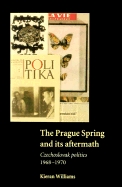1 - Liberalization
Published online by Cambridge University Press: 05 July 2011
Summary
For all their many virtues, the reforms of 1968, in intention and execution, amounted to only the liberalization of a Leninist regime, the gradual widening by the ruling élite of ‘the non-prohibited zone, the sphere of things permitted, the space where people can feel themselves more or less free’. Dubček repeatedly spoke only of expanding priestor, which can be roughly translated as ‘space’ or ‘scope’, to allow wider participation. Liberalizers were certainly not without ambitions; like revolutionaries, they understood the need to overcome societal disequilibrium and achieve a new integration of institutions, values, and expectations. Given, however, its aim of preserving and improving, not destroying, existing institutions, liberalization should not be studied in the same terms as revolution.
The analysis of the 1968 changes that follows is inspired by one of the few frameworks available for analysis of great reform, produced by Oksenberg and Dickson. It will consider first the origins of liberalization with reference to reformers' cognitive and normative frameworks and contingent strategic choices. Then it will show how the reforms intended to change the relationship between the party-state and society through a new distribution of power among and within institutions, and a new concept of economic rationality. It will conclude with a critique of the reforms' eclecticism and the problems of coalition management and breakdown, to be explored in chapters 2 and 3.
- Type
- Chapter
- Information
- The Prague Spring and its AftermathCzechoslovak Politics, 1968–1970, pp. 3 - 28Publisher: Cambridge University PressPrint publication year: 1997



